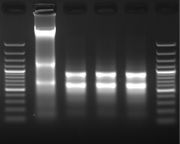Result Type
Refine Result

VWR® for nucleic acid preparation
Featuring solutions covering the entire workflow: Sample disruption & homogenisation, nucleic acid isolation, photometry, centrifugation & storage.
Need pure DNA or RNA?
get it quick & easy.
You Searched For: epichlorohydrin
Corrected to: "epichlorohydrin"
Other possible search terms:
Your search request has been modified to limit number of results. Your search was -Soluble+beta-cyclodextrin+polymer+crosslinked+with+epichlorohydrin
38,519 results were found
SearchResultCount:"38519"
Sort Results
List View
Easy View
List View
Easy View